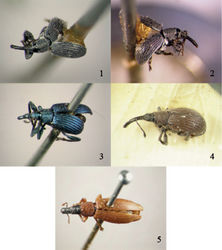Apion limbatum
| Notice: | This page is derived from the original publication listed below, whose author(s) should always be credited. Further contributors may edit and improve the content of this page and, consequently, need to be credited as well (see page history). Any assessment of factual correctness requires a careful review of the original article as well as of subsequent contributions.
If you are uncertain whether your planned contribution is correct or not, we suggest that you use the associated discussion page instead of editing the page directly. This page should be cited as follows (rationale):
Citation formats to copy and paste
BibTeX: @article{Alonso-Zarazaga2013ZooKeys317, RIS/ Endnote: TY - JOUR Wikipedia/ Citizendium: <ref name="Alonso-Zarazaga2013ZooKeys317">{{Citation See also the citation download page at the journal. |
Ordo: Coleoptera
Familia: Apionidae
Genus: Apion
Name
Apion limbatum Thunberg, 1813: 382 – Wikispecies link – Pensoft Profile
Original description
A. limbatum: cinereo-fuscum, elytrorum sutura basi margineque externo albidis.
Magnitudo minoris pediculi; totum glabrum, cinereo-coerulescens.
Elytra striata sutura basi margineque externo albo.
Pedes inermes.
Material studied
One male specimen, glued to a pin 20.4 mm long and 0.59 mm in diameter with the following data: 1293, Cap. The original Thunberg labels, which I have not seen, read: “Apion” (genus label) and “limbatum. Cap.” (species label). It is here designated as the lectotype of this species. The specimen is severely damaged, the abdomen is broken and separated from the body and the elytra are open, but fortunately all legs and antennae are entire. I have been able to recover the abdomen and prepare the remainder of the ventrites, terminalia and genitalia in a drop of DMHF (water- or ethanol-soluble resin) on an acetate card. Study of the specimen showed it to be a member of an hitherto undescribed genus, which is described below.
Taxon Treatment
- Alonso-Zarazaga, M; 2013: Types of species of Apionidae (Coleoptera) described by Carl Peter Thunberg (1743–1828) with description of a new genus ZooKeys, 317: 89-101. doi
Images
|


